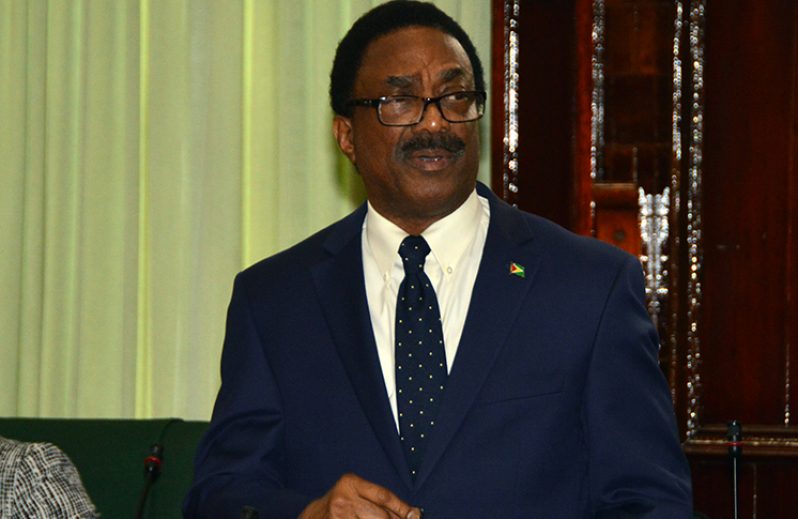-tells court chief justice erred in law and fact
-says decision was unreasonable
ATTORNEY General Basil Williams has filed two appeals challenging Chief Justice Roxane George-Wiltshire’s decision to uphold Speaker of the National Assembly, Dr. Barton Scotland’s ruling that the no-confidence motion against the government was validly passed.
In the High Court last Thursday, the chief justice ruled that 33 constituted an absolute majority in the 65-member National Assembly, and as such, the motion was validly carried on the night of December 21, 2018.
In the case Attorney General v the Speaker of the National Assembly and the Leader of the Opposition, Williams, in his application to the Court of Appeal, said he is dissatisfied with the “whole” decision.
“The Honourable Chief Justice Roxanne George-Wiltshire erred and misdirected herself in law when she ruled that the motion of no-confidence upon a division vote of 33:32 members of the National Assembly was validly passed as the requisite majority of all the elected members of the National Assembly, pursuant to article 106 (6) of the constitution,” the Attorney General contended.
According to him, the chief justice erred in law and in fact. He is of the strong opinion that her decision was unreasonable and cannot be supported having regard to the evidence. Williams informed the court that further grounds of appeal will be filed when the judgment of the chief justice becomes available.
In handing down her decision, the Chief Justice George-Wiltshire explained that in acquiring a majority, one side must acquire one more than the other side. An absolute majority, she said, as specified by the constitution, is a majority of all Members of Parliament present regardless if they are present or not. The chief justice concluded that an absolute majority is 33.
“At least 33 votes must always be obtained to meet that requirement. If 55 members are present, a majority of all elected members of the National Assembly would still be 33. If only 45 are present, a majority of all elected members of the National Assembly would still be 33, and even if only 33 members are present, a majority of all elected members of the National Assembly would still be 33,” Chief Justice George-Wiltshire explained. The attorney general is hoping to have the Court of Appeal overturn the chief justice’s ruling.
The attorney general is also challenging the decision of the chief justice in the case Christopher Ram v The Attorney General and the Leader of the Opposition. That ruling was similar to the majority case; however, in the case of Ram, Chief Justice George-Wiltshire said that Cabinet should have resigned on the night of December 21, 2018, when the motion was declared carried by the speaker.
Williams, in filing his appeal, told the Appellate Court that he is dissatisfied with the decision of the High Court.
“The Honourable Chief Justice Roxanne George-Wiltshire erred and misdirected herself in law when she ruled that on 21st December, 2018, the National Assembly of Guyana properly, validly and lawfully passed a motion on a vote of confidence provided for by Article 106 (6) of the constitution in which the government was defeated,” the attorney general stated.
He is contending too that the chief justice erred and misdirected herself in law when she ruled that Cabinet should have resigned with immediate effect upon defeat of the government in accordance with Article 106 (6) of the constitution.
Williams is arguing that the decision was unreasonable and cannot be supported, having regard to the evidence. He wants the court to set aside her decision.
The chief justice ruled that Cabinet, which is a subset of government, should have resigned with immediate effect upon passage of the no-confidence motion while the government remains in office until the President takes the oath of office following an election. That election, according to Article 106 (7), shall be held within 90 days of the defeat of a government or such longer period as the National Assembly by resolution, supported by not less than two-thirds of the votes of all elected members.
Contrary to the arguments put by the attorney general, that to have a government without a Cabinet would be a recipe for chaos, the chief justice, said there would be no resulting chaos.
It must be noted that while the Cabinet, including the President, is required to resign, the President remains the President of Guyana and the ministers remain ministers of government and will continue to function in those capacities. According to the constitution, they are required to resign after the President takes the oath of office following the election.




.png)









